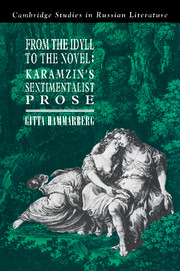Book contents
- Front Matter
- Contents
- Preface and acknowledgments
- Notes on the text
- 1 The literary and intellectual context
- 2 Theory of Sentimentalism
- 3 The literary model: the idyll
- 4 The extra-literary model: salon trifles
- 5 Serious Sentimental tales: narrator as narratee
- 6 Humorous Sentimental tales: narrator as parodist
- Notes
- Bibliography
- Index
6 - Humorous Sentimental tales: narrator as parodist
Published online by Cambridge University Press: 22 September 2009
- Front Matter
- Contents
- Preface and acknowledgments
- Notes on the text
- 1 The literary and intellectual context
- 2 Theory of Sentimentalism
- 3 The literary model: the idyll
- 4 The extra-literary model: salon trifles
- 5 Serious Sentimental tales: narrator as narratee
- 6 Humorous Sentimental tales: narrator as parodist
- Notes
- Bibliography
- Index
Summary
Humor as a vital principle in Russian Sentimentalist prose fiction has, in general, been underestimated. The tendency has been to stress the serious (realistic, historical, moral, pedagogical, psychological) aspects even of the most humorous works. Sentimentalism has usually been described in terms of lachrymose melancholy, sadness, grief, pessimism, escape from grim (or progressive, depending on the point of view) social reality. As I have tried to show, such moods and topics were indeed prominent, although they were by no means exclusive, and they were furthermore almost always featured as subordinate to a pleasurable aesthetic sublimation through a narrator's perceptive apparatus. The perceptive–cognitive dimension was always more important as a topic, than the ontological.
Humor does not contradict Sentimentalist solipsism in principle. The sine qua non of the sensitive person is that he be moved by surrounding reality, personages, objects, and events. He may react to this environment with any of his inner faculties, the main point being that he react as fully as possible, with all his faculties engaged. Sentimentalism cannot be reduced to emotionalism as opposed to rationalism – both emotion and reason are stressed, although the former may be stressed more than the latter. Furthermore, when reason is stressed, the emphasis is on the individual's rational faculties and processes, rather than on a world organized by a priori rational principles or laws.
- Type
- Chapter
- Information
- From the Idyll to the NovelKaramzin's Sentimentalist Prose, pp. 203 - 273Publisher: Cambridge University PressPrint publication year: 1991

